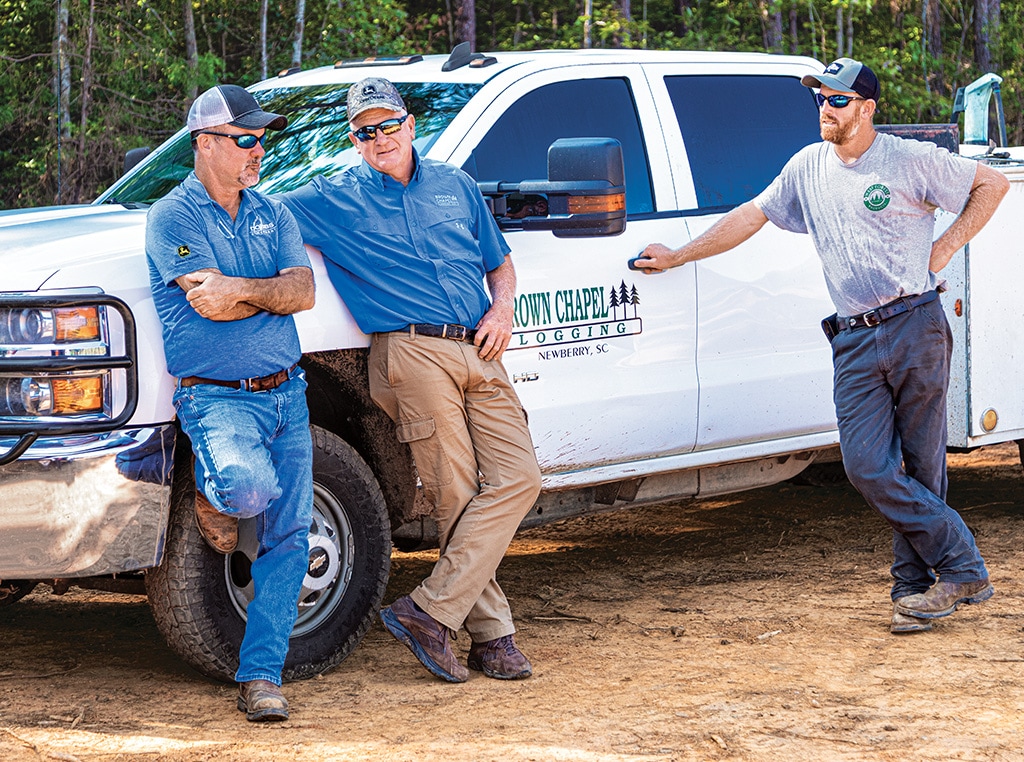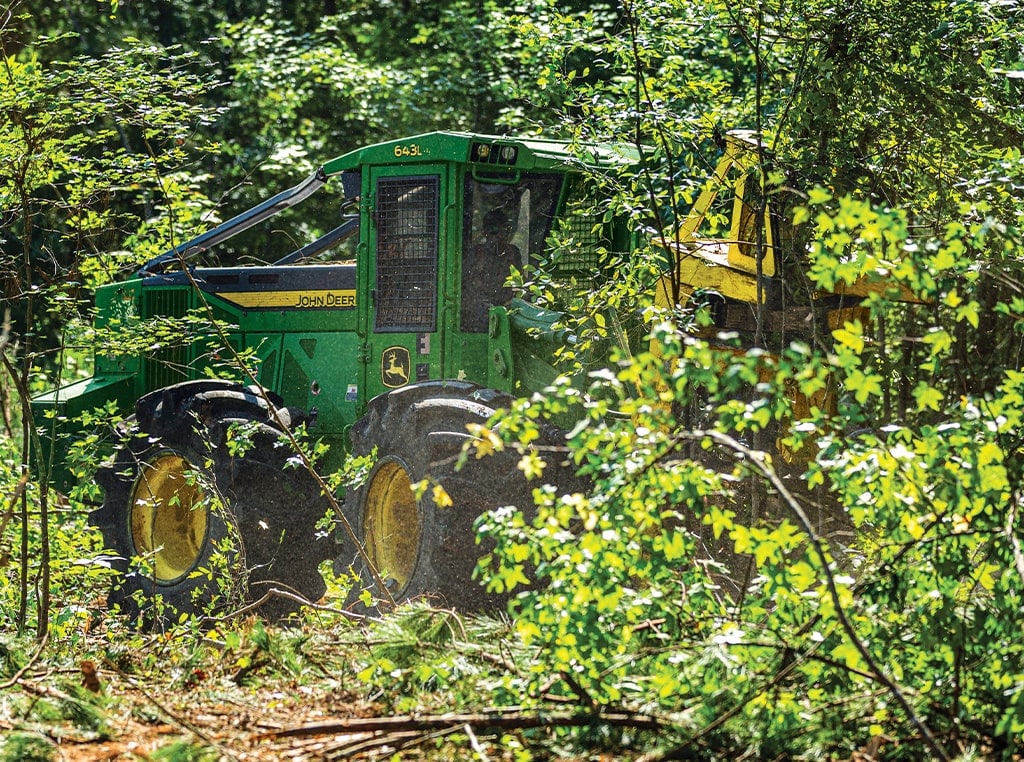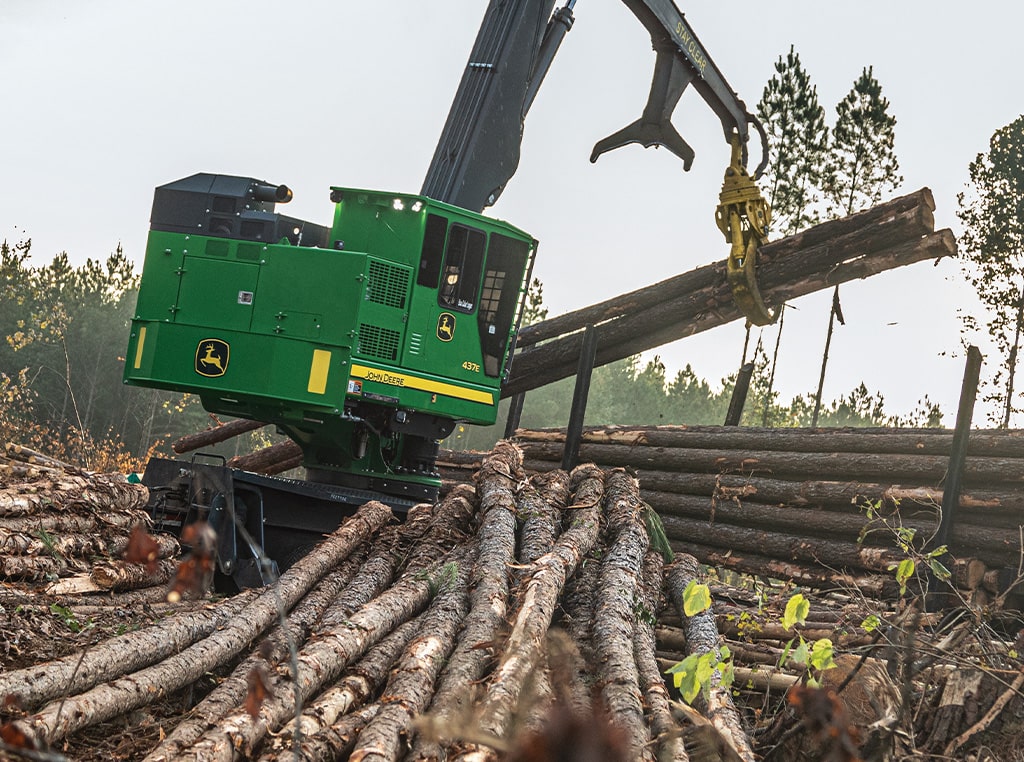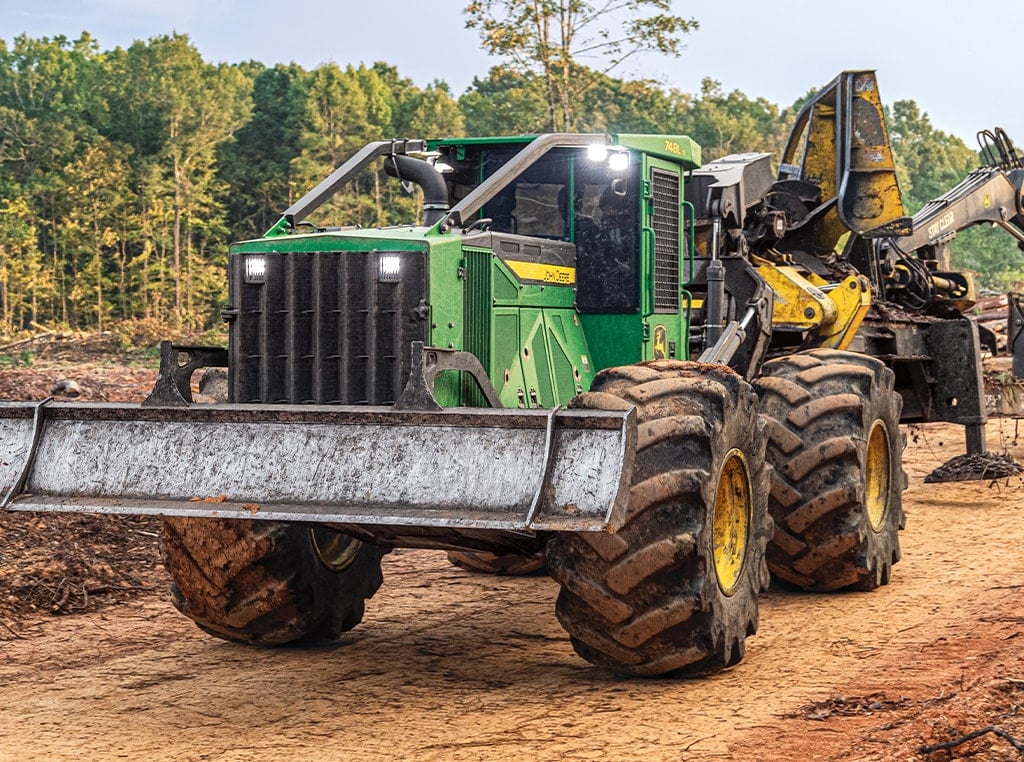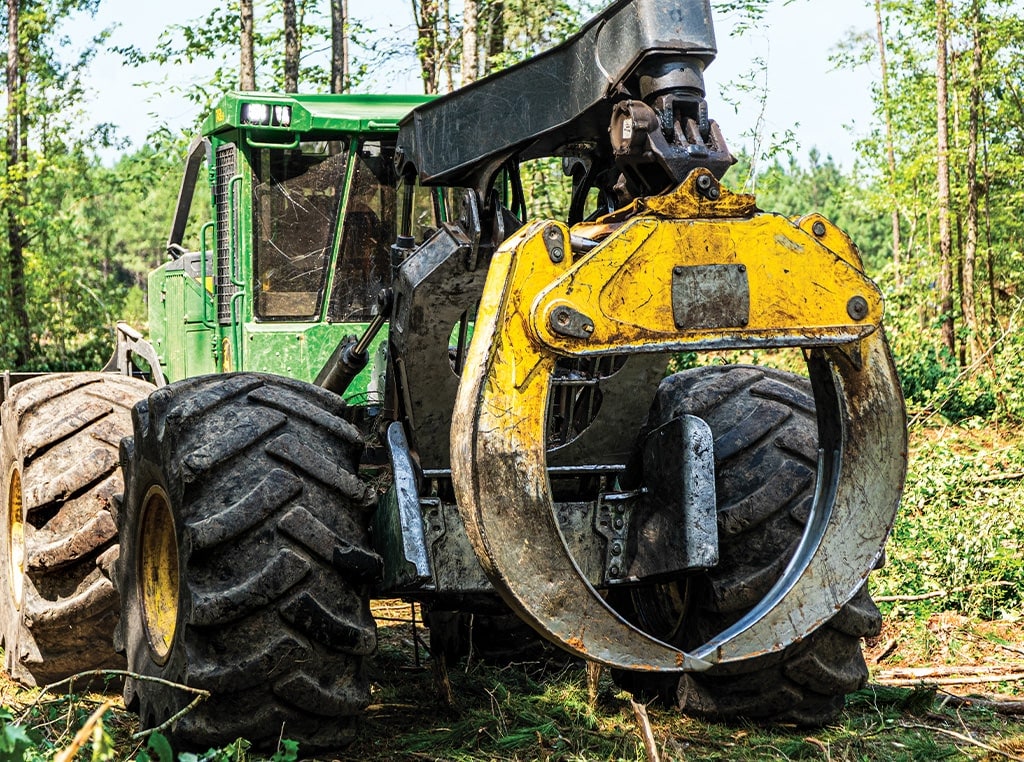Spring 2024
Together We Rise
Bud and Matt West know they can’t do it alone.
![]() 7 MIN READ
7 MIN READ
Every tract in central South Carolina where Matt West logs tells a story. “I’ll move to a tract and my dad [Bud West] will ask, ‘Where did you move to?’ I’ll let him know and he’ll tell me how he and my grandfather cut that one back in the 1970s. It’s neat to work the same land your father and grandfather worked back in the day.”
Often Matt will introduce himself to someone and they’ll ask, “Are you Bud’s son?” Then they’ll launch into a story about his dad or grandfather. “That goes a long way for me in terms of building goodwill that it’s just the type of people they are,” says Matt. “My reputation precedes me.”
Bud West’s grandfather started logging in the mountains of western North Carolina in the 1920s. As if working in the mountains isn’t tough enough, imagine logging with crosscut saws and skidding with a yoke of steers.
“He was hauling hemlock to a local tannery,” says Bud. “It was mountainous, rugged terrain. That’s how logging began for the West family.”
Bud’s grandfather had five sons, including his own father. “Times were tough. We either logged or cleared land to make ends meet. It was just so hard to make a living in the mountains.”
In the 1970s, the West family pulled up stakes and moved to South Carolina where it has been ever since. “We started off land clearing for businesses, power-line rights-of-way, and sewer easements,” Bud recalls. “But there was so much timber to be had that we started logging.”
Better together
Today, Bud and Matt manage the logging business, while Bud’s other sons, Jasen West and Travis McGee, handle land clearing.
According to an old joke about loggers, when they retire, they start working part-time or 40-hour weeks. “We keep telling Dad he needs to slow down,” says Matt. “But he won’t. It’s born in him.”
“We like to work, so it isn’t work, really,” he adds. “You hear some people say, ‘Man, I’ll be glad to get off work.’ But I’m chomping at the bit. I’ve got a good group of guys who are ready to go. They live and breathe it, too.”
Matt is grateful for the support of his family and crew. “You can’t do it on your own,” he says. “You’ve got to have other people behind you. It’s like family out here. The guys who don’t have that mentality don’t last long.”
Matt doesn’t want his workers to come out just for the paycheck. They can do that anywhere. He wants them to enjoy the work and become part of a team. “I want everyone to be successful,” he says. “I’m just an old country boy. I want to see all my people do well.”
Attitude of gratitude
Matt began working for his father’s company, Brown Chapel Logging, on the Monday after he graduated high school in 2008. When he started his own company, West Forest Products, in 2018, the idea wasn’t to split away but to continue as a partnership and reduce some of the burden on his father.
“We needed to grow, but Dad didn’t want to make that investment,” remembers Matt. “I was at the age where I wanted to make it happen. It was tough, but I couldn’t have done it without his guidance and leadership.”
West Forest Products started out running trucks, but as the business grew, Matt realized he needed to start another logging crew. “Dad was very hesitant,” says Matt. “He said, ‘Don’t do it, son.’ But I’m hardheaded, and he knew we could make it work, and we have.”
Working for his dad has been a blessing. “Not everyone gets to work with their father. I’m very fortunate. He’s taught me a lot, and we’ve never had an argument ever.”
The biggest lesson Bud taught Matt was by the example he set: clean living and hard work. “I could talk all day about how good a fella he is,” says Matt. “I get emotional just talking about it because he’s my best friend.”

“You never know what the challenge will be on any given day. When you hit the ground, you better be ready to run.”
Hit the ground running
Logging using mechanized equipment is surely easier than using a crosscut saw and teams of steers, but the Wests face their own set of challenges, including finding good-quality help and rising fuel and insurance costs.
“We just got to roll with it,” says Bud. “You never know what the challenge is going to be on any given day. When you hit the ground, you better be ready to run.”
Managing costs is all about boosting efficiency. “We try to stay as close to the wood as possible, so we don’t have to skid any farther than we need to,” Bud explains. “This helps minimize fuel use.”
Matt coaches his operators to make every move count and to always think about the next guy. If the buncher is sorting properly, the skidder’s job is easier. If the skidder delimbs piles, the loader’s job is easier.
He also wants his workers to not be afraid to take charge. “I want them to always feel like they can call me,” he says. “It took a while to get there, but once everybody got on the same page, it took off. When you get people to do their best instead of just existing, you’ll have a well-oiled logging machine.”

“It’s about trying to be better than we were yesterday. If everybody had that mentality, the world would be a whole lot better place.”
“The John Deere Man”
When Matt started West Forest Products, his local John Deere dealer, Dobbs Equipment, helped him get off the ground. “It was turnkey,” he recalls. “My dealer rep Randy Wilkes had a cutter, skidder, and loader delivered. “He called and said, ‘It’s there, ready to go.’ And we went from there.”
Matt’s six-year-old son Brooks calls Wilkes “the John Deere Man.” When asked what he wants to be when he grows up, Brooks says, “I want to be like Daddy. He’s a logger man.” Around the house, he is Matt’s constant shadow. His dad looks forward to the day they are in the woods together.
Matt became sold on Deere machines when Wilkes initially brought him a 643L-II Wheeled Feller Buncher to demo. “The first time I ran one, it was a night-and-day difference,” he remembers. “With the strength, horsepower, torque, and hydraulic controls, I had no doubts. It’s a mean machine that can cut some monster timber. I told Dad, ‘You have to buy this right now. It’s awesome.’”
“We did, and since then we kept replacing machines until we are all John Deere today,” says Bud. “Our service from Dobbs has been top-notch. You couldn’t ask for more.”
Today the company’s fleet of John Deere equipment includes 648L-II and 748L-II Grapple Skidders, 643L-II Wheeled Feller Bunchers, and 437E Knuckleboom Loaders. “That’s one of the best things we’ve ever done, moving to Deere machines,” says Matt.
Minimal downtime is where Deere machines really shine, according to Matt: “We run these machines 10 or 11 hours a day, and they take a beating. They are built tough.”
Tough machines for a tough business. “But I love it,” says Matt. “Like I told my guys the other day, if you have a bad attitude, you’ll have a bad day. But if you have a good attitude, you’ll have a good day. Out here the job is never done. It’s about trying to be better than we were yesterday. If everybody had that mentality, the world would be a whole lot better place.”
Brown Chapel Logging and West Forest Products are serviced by Dobbs Equipment, West Columbia, South Carolina.
Related Articles
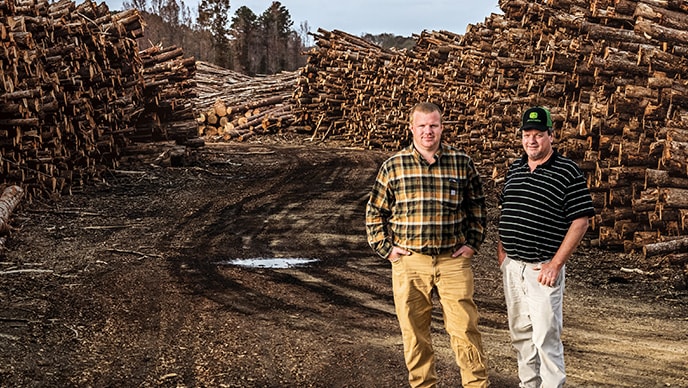
Turning Point
An industrious family operation has mastered the art of year-round logging in the Magnolia State.
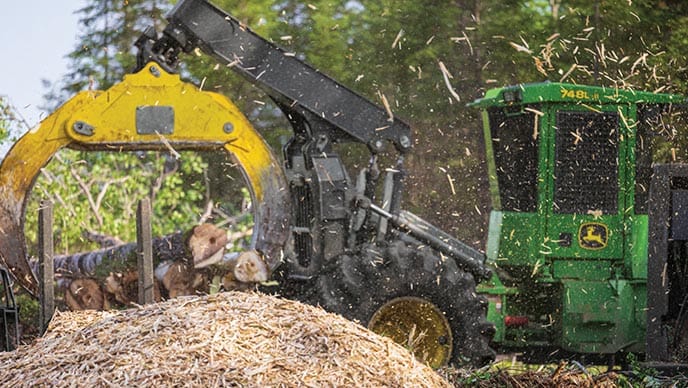
When the Chips Are Down
The people at Carlson Timber Products are there for each other, even in the toughest times.
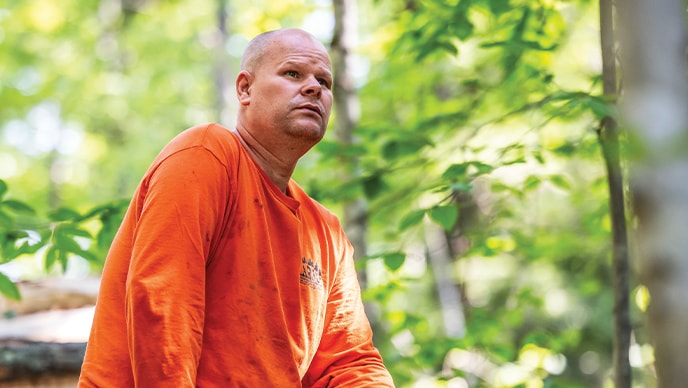
Never Back Down
Harju Logging relies on John Deere equipment and technology to navigate the tough Michigan terrain.
Do you think your company's story would resonate with others in the logging industry?
SHARE YOUR JOURNEY

